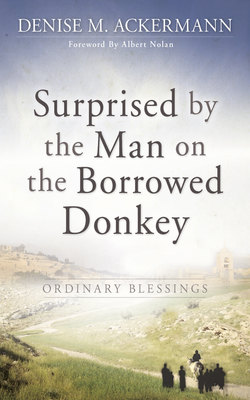Читать книгу Surprised by the man on the borrowed donkey: Ordinary Blessings - Denise Ackermann - Страница 4
Foreword
ОглавлениеSome of us in South Africa have chosen to call our reflections “contextual theology”, but few of us, if any, have been as thoroughly and painstakingly contextual as Denise Ackermann. She does not make use of labels like “contextual theology”, but she is deeply aware at all times of the historical, political, social and economic context of her theology, as well as the personal and biographical circumstances and experiences that have shaped her thinking. This makes for a theology that is thoroughly concrete, experiential and spiritual.
In a way all theology is contextual. The difference is between those who are aware of this and those who are not. The classical definition of theology is “faith seeking understanding”, and we seek understanding by asking questions and searching for answers. Genuine faith questions, however, vary enormously from place to place, time to time and person to person. The questions arise out of our context and experience of life.
Today most theologians are fully aware of this. Too often in the past, though, and sometimes in the present too, theologians have persisted with answering questions other people asked at other times and in other places as if they were the only questions people may grapple with in theology. Those who formulated these questions many years ago were often white clerical males who lived in monasteries, seminaries and universities. They knew nothing of the questions and experiences of women, of black people, of lay people or of the poor, let alone the questions and problems of the world as it is today. The theology of the past had a context, but it is not our context.
A theology that is fully aware of its context and how that is different from other contexts is what we call a contextual theology. Thus feminist theology, black theology and liberation theology, for example, are consciously contextual theologies.
Nor is it only the questions that arise out of our context. The answers are also shaped by the context in which we live and by our biographical experiences. That is not to say that contextual theology is totally subjective and arbitrary. Any Christian theology has to find its answers in Jesus as the incarnate Word of God. However, our particular context and experience of life can give each of us a particular perspective on the meaning of Jesus’ life and death. This perspective can open our eyes to what is already present implicitly in the Word of God. It can provide us with new insights.
The theology of Denise Ackermann’s book is deeply and consciously contextual. And yet it is at every point a book about Jesus, about her honest and personal experience and struggle with faith in Jesus. It is her “biography of faith” – faith in “the man on the borrowed donkey” as she calls him.
Of course, if we are honest, we will discover that there are few, if any, easy answers to the questions that arise for us today. Denise is painfully aware of that. She faces the contradictions, the paradoxes and the mystery of it all. She faces her own experience of being diagnosed with cancer and her more recent experience of macular degeneration with its threat of eventual blindness. She writes about the questions that these experiences raise for her and about her search for answers. It is clear that her faith has enabled her to live fruitfully with unanswered questions.
The result is an amazing number of valuable insights into the meaning of holiness, secularism, spirituality, freedom, death, gratitude, listening, greed, sharing and humour, as well as the wonder of God’s creation, especially in the awesome beauty of birds. Looking at her life, her experience and her context with the eyes of faith enables her to see above all else a history of blessings, many blessings. Hence the subtitle of the book: Ordinary blessings.
Albert Nolan
Johannesburg
4 February 2012
